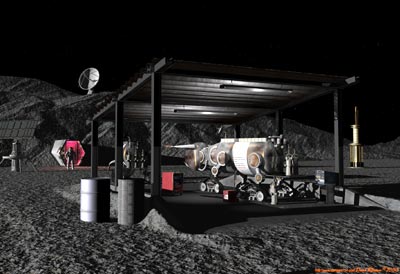|
|
 Charitable giving and bequests might help speed up the development of commercial space settlements. (credit: David Robinson, courtesy of Sam Dinkin) |
Building a foundation for space settlement
by Sam Dinkin
Monday, August 22, 2005
Launch industry revenue was just $2.8 billion worldwide last year according to the Satellite Industry Association. Pathetic. That is just five thousandths of one percent of the global $55-trillion economy. In contrast, we just had a highway bill authorizing federal spending of nearly $50 billion a year on roads for the US alone. Subsidizing space like the highway system would be a good idea (see “Don’t wait for cheap orbital access”, The Space Review, April 25, 2005). But at this point, doubling or tripling launch activity could be achieved by a remarkably small portion of the economy’s income.
If space enthusiasts starting donating a portion of their estate to a foundation that would use it to subsidize space access, launches would rise. How many will join Elon Musk in calling for the colonization of Mars? I, of course, prefer the Moon (see “Colonize the Moon before Mars”, The Space Review, September 7, 2004.) Both will take a bunch of money on an individual scale, but next to nothing on a global scale. $100 billion a year would probably accomplish both. US baby boomers had about $362,000 each back in 1998. By the time they die around 2035, on average, they will probably each pass on an estate worth a million or more. In 2001, bequests to charities were $16 billion, which was about 29% of the net worth of the people who made the bequests.
| If we could get giving toward space related causes up to 1% of giving, it would be $2.5 billion a year toward space. |
If everyone in the world gave a space foundation $85 when they died, it would result in $6 billion a year. If the entire economy were capitalized at a 5.5% interest rate, we would have the world worth $1,000 trillion. If that were all privatized, it would all turn over after 85 years. That’s about $12 trillion a year in wealth turnover even if no one gives anything before they die. Mostly what we are giving our children is access to an education and a wonderful world that is not particularly capitalized. Overall giving is closer to $250 billion, with only a small percentage of it as charitable bequests.
If we could get giving toward space related causes up to 1% of giving, it would be $2.5 billion a year toward space. While it is not the $36 billion that would be donated to space activities if space got 1% of bequests that make up 29% of estates worth $12 trillion if the world were fully capitalized, it is still a good chunk of change. That’s enough to nearly double launch industry revenue if it were put to that. If it were put half to launches and half to payloads, it would still increase demand 50%.
While only one-sixth as important as lobbying NASA to spend its $16 billion a year wisely, trying to get boomers (and their parents) to give a portion of their estate to space causes is a clearer field. My guess is that space causes are getting nowhere near that much in donations.
As the world economy continues to grow at 5% a year and the world becomes increasingly better capitalized, donations will rise. I’ll start a Moon colony foundation if no one else does too quickly.
Sam Dinkin is a regular columnist for the Space Review and Founder and CEO of SpaceShot, Inc. SpaceShot is giving 3% of its profits to 501(c)3 charities according to the choices of its customers. If you have a space related 501(c)3 and would like to be listed on the SpaceShot website, please contact dinkin@space-shot.com or 888-434-6546.
|
|
